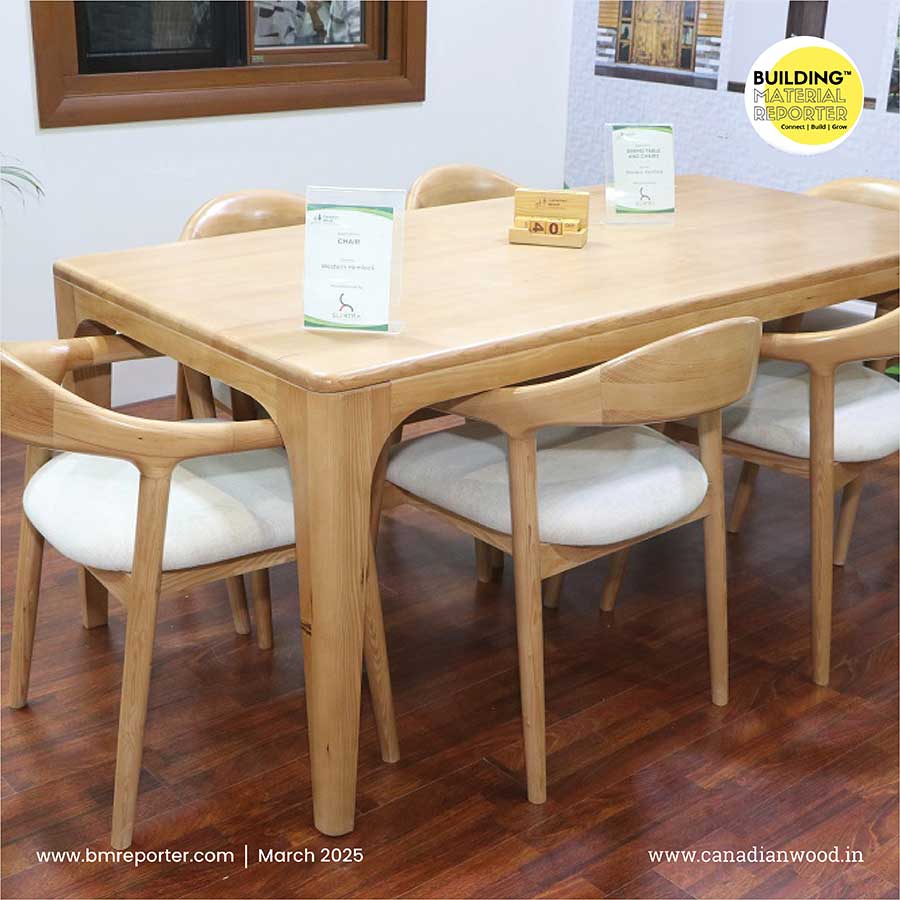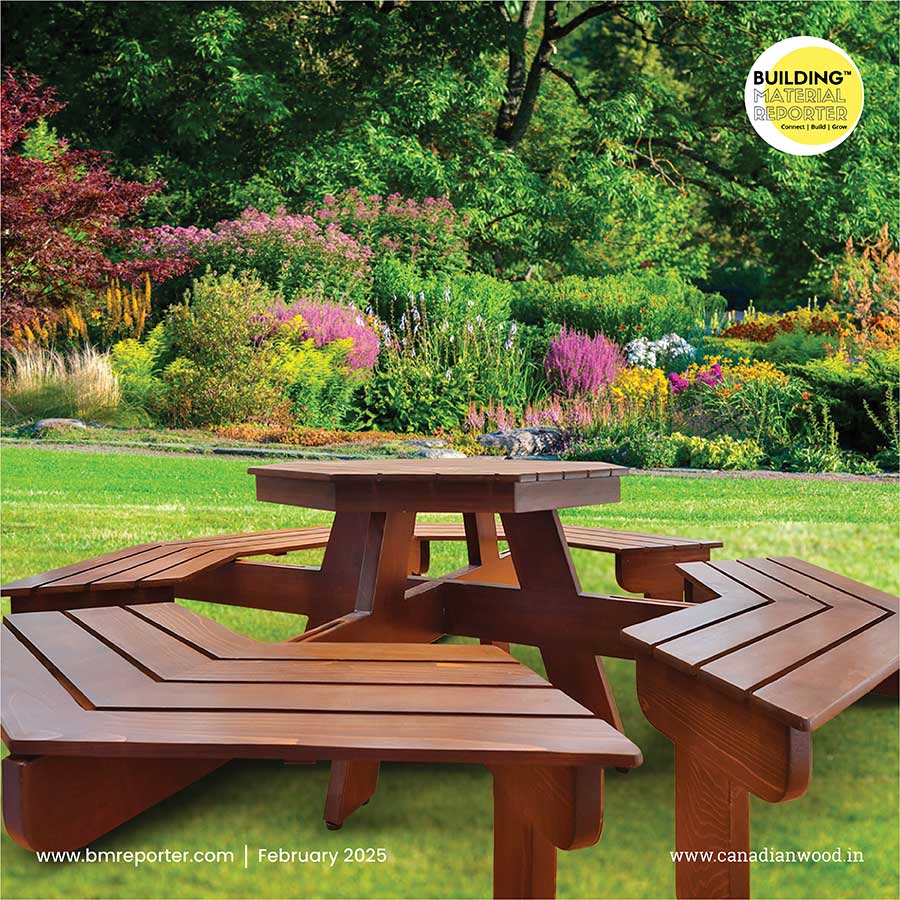Exploring the Sustainable Wonders of Canadian Wood Species
- February 6, 2024
- By: Yukti Kasera
- NEWS
(5).jpg) The importance of sustainability has become increasingly evident as the world confronts environmental crises, compelling individuals to reassess their lifestyles and revisit age-old solutions. Among these solutions is wood, one of the oldest construction materials from time immemorial, positioned to counteract the progressively harmful effects of climate change. One such name that has been leading from the front across the world including India, is Canadian Wood. It is one of the leading brands to promote wood as a sustainable material for green architecture.
The importance of sustainability has become increasingly evident as the world confronts environmental crises, compelling individuals to reassess their lifestyles and revisit age-old solutions. Among these solutions is wood, one of the oldest construction materials from time immemorial, positioned to counteract the progressively harmful effects of climate change. One such name that has been leading from the front across the world including India, is Canadian Wood. It is one of the leading brands to promote wood as a sustainable material for green architecture.
Nestled within the expansive beauty of Canada's untamed forests, the treasure trove of natural wonder and resources of Canadian Wood stands tall as an emblem of sustainability and conscientious forestry practices. It is gaining considerable attention, especially during a period marked by a surge in demand for mass timber construction. In recent times, individuals are not only investing in it for residential structures but also for the construction of various buildings including skyscrapers, hospitals, airport terminals and shipping warehouses, incorporating substantial amounts of timber in the process.
Looking ahead, Canadian Wood anticipates its participation at the IndiaWood Exhibition on 24th February 2024, at Bangalore International Exhibition Centre (BIEC), Bengaluru, India. The event promises not only a showcase of Canadian Wood's species but also its sustainable applications for an immersive experience for their attendees.
(4).jpg) Beyond the exhibition space, Canadian Wood seizes the opportunity for strategic branding possibilities, further amplifying its commitment to sustainability, responsible forestry practices and wood from certified forest. The event serves as a key platform to connect with manufacturers, Importers, industry professionals, architects, builders, and other stakeholders, fostering collaborations that advance the cause of sustainable construction.
Beyond the exhibition space, Canadian Wood seizes the opportunity for strategic branding possibilities, further amplifying its commitment to sustainability, responsible forestry practices and wood from certified forest. The event serves as a key platform to connect with manufacturers, Importers, industry professionals, architects, builders, and other stakeholders, fostering collaborations that advance the cause of sustainable construction.
Participating in events like the IndiaWood Exhibition 2024 aligns with Canadian Wood's dedication to providing high-quality and environmentally conscious products. It also actively contributes to the discourse around green architecture and sustainable design, reinforcing its position as a leader in the field.
(3).jpg) In an era where environmental concerns loom large, the significance of sustainable materials cannot be overstated, but what is that gives Canadian Wood the edge over other sustainable materials?
In an era where environmental concerns loom large, the significance of sustainable materials cannot be overstated, but what is that gives Canadian Wood the edge over other sustainable materials?
Derived from certified and renewable forests in British Columbia (B.C.), Canadian Wood presents the rich tapestry of wood species through sustainable sourcing. These options encompass western hemlock, Douglas fir, yellow cedar, western red cedar, and spruce-pine-fir (SPF), each possessing unique characteristics and applications. For instance, western red cedar is renowned for its natural beauty and durability; it stands out as a favorite for exterior applications such as siding and decking. Douglas fir, on the other hand, with its remarkable strength and versatility, finds its niche in structural applications and residential flooring. The diverse offerings from Canadian Wood empower architects and builders to select the right wood for the right applications, ensuring both functionality and aesthetic appeal. These wood species are responsibly harvested from B.C. Forests, which is renowned for its exemplary practices in sustainable forest management.
Setting a Gold Standard in Responsible Forestry
At the heart of Canadian Wood's philosophy lies an unwavering commitment to sustainability, especially since it is sourced from B.C. forests, which stands at the forefront of sustainable forest management practices, setting high standards rooted in scientific research, robust forest laws and regulations, meticulous processes and extensive public consultation. In an age dominated by environmental consciousness, the B.C. Forest industry sets a gold standard for responsible forestry. This commitment extends beyond mere compliance. It rigorously adheres to environmental standards and ensures that the practices not only meet regulatory requirements but actively contribute to the health of the forests, preserving biodiversity and ecological balance.
(3).jpg) One key practice that distinguishes B.C.’s forestry approach is the 1% harvesting check. Rigorous laws dictate that only less than 0.35% of the forest, approximately 200,000 hectares, can be harvested annually. This harvested area must be promptly reforested by planting native tree species. The Chief Forester is mandated to review the timber supply every decade, regulating the amount of wood that can be harvested across various forest units, ensuring a balanced and sustainable approach.
One key practice that distinguishes B.C.’s forestry approach is the 1% harvesting check. Rigorous laws dictate that only less than 0.35% of the forest, approximately 200,000 hectares, can be harvested annually. This harvested area must be promptly reforested by planting native tree species. The Chief Forester is mandated to review the timber supply every decade, regulating the amount of wood that can be harvested across various forest units, ensuring a balanced and sustainable approach.
In addition to commercial timber growth, there is a strong emphasis on forest health protection. Sustainable forestry employs various techniques like the silvicultural system (encompassing planning, harvesting, and regeneration), selection cutting (practiced on dry and steep terrains) and clearcutting to prevent wildfires.
B.C.’s forest management practices also take into account new-age technology such as satellite based aerial scanning, high-tech drones and lasers to scan, monitor, and safeguard forests and their terrain. These technologies also contribute to environmental research to help address challenges such as fiber loss during harvesting and manufacturing processes. Biodiversity conservation is another cornerstone of its sustainable forestry practices. This involves engaging British Columbians in decision-making regarding protection of over 15% of its public lands, forests and water, resulting in the successful conservation of biodiversity and protection of wildlife habitats.
(5).jpg)
The Third-Party Approval & Community Engagement
B.C. Forest industry places considerable importance on certifying its forests, aligning with its current legal rules and regulations. So apart from employing best practices that enhances the health and longevity of the forests, it adheres to third-party certification standards including the Canadian Standards Association's (CSA) Sustainable Forest Management Standard in partnership with the Programme for the Endorsement of Forest Certification (PEFC), Forest Stewardship Council (FSC) and Sustainable Forestry Initiative (SFI). This helps it to meet the highest environmental and social criteria and provide worldwide credibility to B.C.’s renewable forests. Approximately 9% of the world's certified forests are found in Canada.
The industry also recognises the significance of community engagement and actively involves local stakeholders in its operations, which includes the conservation of biodiversity. By undertaking initiatives that support education, healthcare, and infrastructure development, it shows its commitment to enhancing the well-being of the regions where it operates. It also takes its commitment to sustainability seriously and champions the cause by educating consumers and businesses about the inherent benefits of choosing sustainable materials. This, in turn, stimulates demand for its products, fostering a market that places a premium on environmental stewardship.
(2).jpg) The brand, however, not only takes pride in providing aesthetically pleasing products but also those with minimal environmental impact and diverse applications- right from the warm hues and durability of western red cedar to the flexibility of Douglas fir. For interiors, Douglas fir and western hemlock are prized for long lengths, minimal knots, and excellent coating adherence, while the former, renowned globally for its strength-to-weight ratio, is ideal for heavy structural uses like post and beam construction. Western hemlock, favoured for luxurious interiors, is perfect for furniture and paneling. Western red cedar and yellow cedar are sought after for natural solid wood applications such as pergolas, decking, and garden furniture.
The brand, however, not only takes pride in providing aesthetically pleasing products but also those with minimal environmental impact and diverse applications- right from the warm hues and durability of western red cedar to the flexibility of Douglas fir. For interiors, Douglas fir and western hemlock are prized for long lengths, minimal knots, and excellent coating adherence, while the former, renowned globally for its strength-to-weight ratio, is ideal for heavy structural uses like post and beam construction. Western hemlock, favoured for luxurious interiors, is perfect for furniture and paneling. Western red cedar and yellow cedar are sought after for natural solid wood applications such as pergolas, decking, and garden furniture.
Apart from the versatile applications and aesthetics, responsibly sourced and certified Canadian wood species provide numerous advantages that enhance indoor environments, promoting a healthier and more harmonious atmosphere. It also plays a pivotal role in sustainable architecture and Biophilic design, establishing a connection between indoor spaces and nature. This connection fosters a sense of tranquility and balance, contributing to a more holistic and sustainable living experience.
(4).jpg)
With so much to offer, it is no wonder that Canadian Wood has emerged as a beacon of sustainability in the forestry industry and showcasing how responsible practices can seamlessly coexist with economic viability.
Building Material Reporter believes in serving the best! Stay tuned with us for more ideas and news updates related to home decor, design, new projects, architecture and construction materials in the industry.








